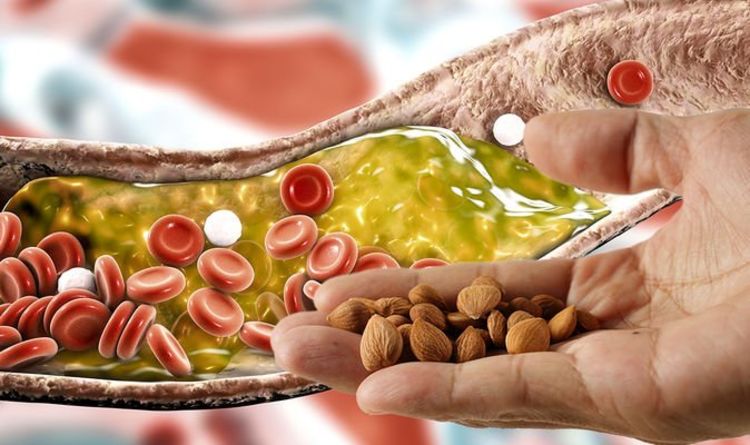High cholesterol: The ‘bitter’ seeds that cause high levels to ‘progressively decrease’
High cholesterol: Nutritionist reveals top prevention tips
We use your sign-up to provide content in ways you’ve consented to and to improve our understanding of you. This may include adverts from us and 3rd parties based on our understanding. You can unsubscribe at any time. More info
High cholesterol means you have too much cholesterol in your blood. Cholesterol – a waxy substance that’s produced inside the liver and by eating food – performs many important roles in the body. However, LDL cholesterol, which is dubbed the “bad” cholesterol, can clog up your arteries if you carry too much of it in your blood. To ward off the threat of heart disease, it is therefore vital to lower high LDL levels.
This is where diet steps in. Research has identified many cholesterol-busting foods over the years and bitter apricot seeds are the latest food to come under the microscope.
Bitter apricot seeds, also called apricot kernels, are found inside the stone of an apricot.
The kernels contain protein, fibre, and a high percentage of oil, which people can extract from the kernel.
The objective of a study published last year in the International Journal of Environmental Research and Public Health was to evaluate the effect of short-term consumption of bitter apricot seeds on cardiovascular risk factors with a special focus on LDL cholesterol.

A group of 34 adult volunteers (21 female/13 male) consumed 60 mg body weight of bitter apricot seeds daily for 42 days.
Subjects were divided into two groups: one with normal cholesterol levels and one with elevated total cholesterol levels.
What did the researchers find out?
Blood serum levels of total cholesterol, LDL cholesterol and HDL cholesterol (the “good cholesterol) did not change significantly in the normal cholesterol group.
However, there was a significant decrease in LDL cholesterol in the elevated cholesterol group.
DON’T MISS
Cancer: The hot drink ‘strongly’ associated with cancer [INSIGHT]
Visceral fat: Lipid-lowering food that reduces belly fat [TIPS]
High cholesterol: Three signs on your toes [ADVICE]
LDL levels “progressively decreased” after 42 days of apricot seeds consumption in the elevated cholesterol group, the researchers wrote.
“The results of the present study support the hypothesis that daily consumption of bitter apricot seeds for 42 days positively modified the lipoprotein profile in the group with elevated total cholesterol,” the researchers concluded.
Other important dietary tips
“It’s much more important to cut down on foods which contain saturated fats,” advises cholesterol charity Heart UK.
Why? “That’s because saturated fats affect how the liver handles cholesterol. So, eating saturated fats can raise your blood cholesterol.”

Saturated fat is found in:
- Butter, ghee, suet, lard, coconut oil and palm oil
- Cakes
- Biscuits
- Fatty cuts of meat
- Sausages
- Bacon
- Cured meats like salami, chorizo and pancetta
- Cheese
- Pastries, such as pies, quiches, sausage rolls and croissants
- Cream, crème fraîche and sour cream
- Ice cream
- Coconut milk and coconut cream
- Milkshakes
- Chocolate and chocolate spreads.
You should try to replace saturated fats with unsaturated fats which are better for your heart, advises Heart UK.
Lean meat, especially offal, such as liver, kidney, sweetbreads, heart and tripe, is a good source of unsaturated fat.
There are some foods which are low in saturated fat but high in cholesterol. These include eggs, some shellfish, liver, liver pate and offal.

“Most people don’t need to cut down on the cholesterol that’s found in these foods,” notes Heart UK.
Other important tips
Engaging in regular exercise is also integral to cholesterol control.
According to the NHS, you should aim to do at least 150 minutes (2.5 hours) of exercise a week.
Some good things to try when starting out include:
- Walking – try to walk fast enough so your heart starts beating faster
- Swimming
- Cycling.
Source: Read Full Article



